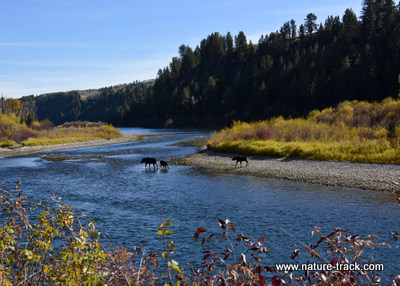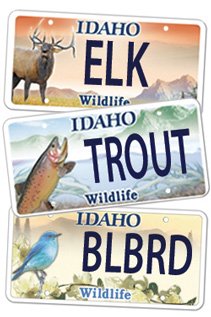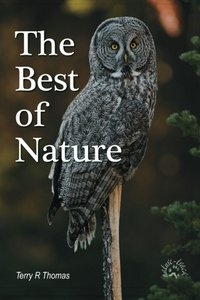Nature as a Partner

A view like this is a reminder that we need natural security as much as we need national security.
When the flow of electrons suddenly stopped one wintry Sunday years ago, our church meeting was plunged into darkness. With the exception of emergency backup lights shining weakly above the doors and a dozen or more iPads and cellphones now glowing conspicuously in the semi-darkness, light was pretty scarce. We carried on in the murkiness for awhile, but with news that the outage extended from Ucon to St. Anthony, the meeting adjourned and we went home two hours early.
I saw it as a gift from heaven until I got home. I punched the garage door opener—no response. Oops. No power. No key to the house either—it was on the other key ring. No cellphone to call the kids for a quick rescue—both were on the counter—we didn’t need them at church. Not to mention, I am pretty anal about locking windows. I muttered, loudly enough to ensure that my wife would hear and understand how frustrated I was that she doesn’t carry a house key.
In desperation, I slogged through the mud and checked windows. One small one was not quite closed. With a BBQ brush and a garden tool, I managed to slide it up and squeeze through and my first challenge was over.
Once inside, we prepared for a long outage. As a priority, we ate as much ice cream as we could, realizing it would be the first thing to melt. Then we put on warm clothes, stocked up some water, and called the kids to see how they were faring.
It was a taste of something like Hurricane Katrina and I was excited to test our survival preparation and battle the elements. I was disappointed when the power was restored an hour later.
As a race, we weren’t always this soft. Our ancestors lived in caves, igloos, tepees, and grass houses. There was no indoor plumbing, or outdoor plumbing for that matter. They killed or raised their own food, made their own tools.
They knew not to build where winds would rip or where overreaching tides could sweep them away. If they lived along rivers, they respected the floodplain. They understood that rivers are living things and knew that they would occasionally have to move the camp as rivers changed course. In short, they lived with nature. They did not have the technology to try to do otherwise.
That slowly changed through time. As our technological abilities increased, so did our arrogance. We came to see nature as something to be conquered, subdued, and altered. I have heard it said that we presumed to correct all of God’s “mistakes”. We took what we wanted and built where it pleased us, without thought of the consequences.
As we approach a new year, perhaps it is time for us to rethink that relationship with a bit more charity. We all want prosperity, but do we crave it enough to ruin what makes our home special? I believe we need to view Nature as a partner, not as a villain or a competitor or even just in the way. We need natural security every bit as much as national security.

Wildlife License Plates
Great news! as of 2024, there are three NEW designs for license plates. They still are bluebird, cutthroat trout and elk, but they are beautiful.
Idaho Wildlife license plates provide essential funding that benefits the great diversity of native plants and wildlife that are not hunted, fished or trapped—over 10,000 species or 98% of Idaho’s species diversity. Game species that share the same habitats (such as elk, deer, antelope, sage-grouse, salmon, trout) also benefit from these specialty plates.
No state tax dollars are provided for wildlife diversity, conservation education and recreation programs. Neither are any revenues from the sale of hunting or fishing licenses spent on nongame species. Instead, these species depend on direct donations, federal grants, fundraising initiatives—and the Idaho Wildlife license plates.
Both my vehicles have Bluebird Plates. I prefer the bluebird because the nongame program gets 70 percent of the money from bluebird plates, but only 60 percent of the money from elk and trout plates - 10 percent of the money from elk plates supports wildlife disease monitoring and testing programs (to benefit the livestock industry) and 10 percent from cutthroat plates supports non-motorized boat access.
Incidentally, in 2014, the Idaho Legislature denied the Department of Fish and Game the ability to add new plates or even to change the name of the elk and cutthroat plates (very specific) to wildlife and fish plates, a move that would have allowed for changing images occasionally and generating more revenue. It would seem that they believe that we Idahoans don't want a well funded wildlife program.
I think it is time we let the Legislature know that Idahoan support wildlife funding and that we would like to see these generic plates come to fruition.

"WOW. What a phenomenal piece you wrote. You are amazing." Jennifer Jackson
That is embarrassing, but actually a fairly typical response to my nature essays. Since The Best of Nature is created from the very best of 16 years of these nature essays published weekly in the Idaho Falls Post Register (online readership 70,000), it is a fine read. It covers a wide variety of topics including humorous glimpses of nature, philosophy, natural history, and conservation. Readers praise the style, breadth of subject matter and my ability to communicate complex and emotional topics in a relaxed and understandable manner.
Everyone can find something to love in this book. From teenagers to octogenarians, from the coffee shop to the school room, these nature essays are widely read and enjoyed.
Some of the essays here are my personal favorites, others seemed to strike a chord with readers. Most have an important message or lesson that will resonate with you. They are written with a goal to simultaneously entertain and educate about the wonderful workings of nature. Some will make you laugh out loud and others will bring a tear to the eye and warm your heart.
Readers Write:
"You hit a home run with your article on, Big Questions in Nature. It should be required reading for everyone who has lost touch with nature...great job!" Joe Chapman
"We enjoyed your column, Bloom Where Planted. Some of the best writing yet. The Post Register is fortunate to have your weekly columns." Lou Griffin.
To read more and to order a copy, click here or get the Kindle version
Copies are also available at:
Post Register
Island Park Builders Supply (upstairs)
Barnes and Noble in Idaho Falls
Harriman State Park, Island Park
Museum of Idaho
Valley Books, Jackson Wyoming
Avocet Corner Bookstore, Bear River National Wildlife Refuge, Brigham City, Utah
Craters of the Moon National Monument Bookstore, Arco, Idaho
Wildlife License Plates
Great news! as of 2024, there are three NEW designs for license plates. They still are bluebird, cutthroat trout and elk, but they are beautiful.
Idaho Wildlife license plates provide essential funding that benefits the great diversity of native plants and wildlife that are not hunted, fished or trapped—over 10,000 species or 98% of Idaho’s species diversity. Game species that share the same habitats (such as elk, deer, antelope, sage-grouse, salmon, trout) also benefit from these specialty plates.
No state tax dollars are provided for wildlife diversity, conservation education and recreation programs. Neither are any revenues from the sale of hunting or fishing licenses spent on nongame species. Instead, these species depend on direct donations, federal grants, fundraising initiatives—and the Idaho Wildlife license plates.
Both my vehicles have Bluebird Plates. I prefer the bluebird because the nongame program gets 70 percent of the money from bluebird plates, but only 60 percent of the money from elk and trout plates - 10 percent of the money from elk plates supports wildlife disease monitoring and testing programs (to benefit the livestock industry) and 10 percent from cutthroat plates supports non-motorized boat access.
Incidentally, in 2014, the Idaho Legislature denied the Department of Fish and Game the ability to add new plates or even to change the name of the elk and cutthroat plates (very specific) to wildlife and fish plates, a move that would have allowed for changing images occasionally and generating more revenue. It would seem that they believe that we Idahoans don't want a well funded wildlife program.
I think it is time we let the Legislature know that Idahoan support wildlife funding and that we would like to see these generic plates come to fruition.